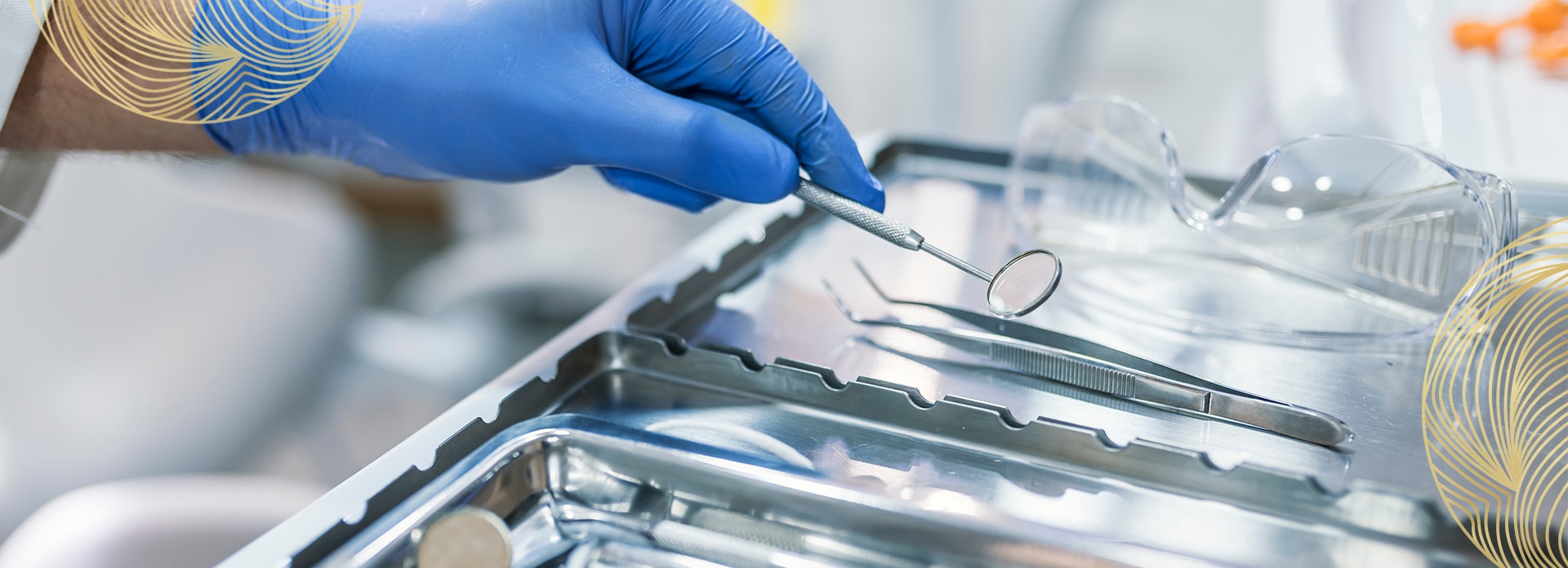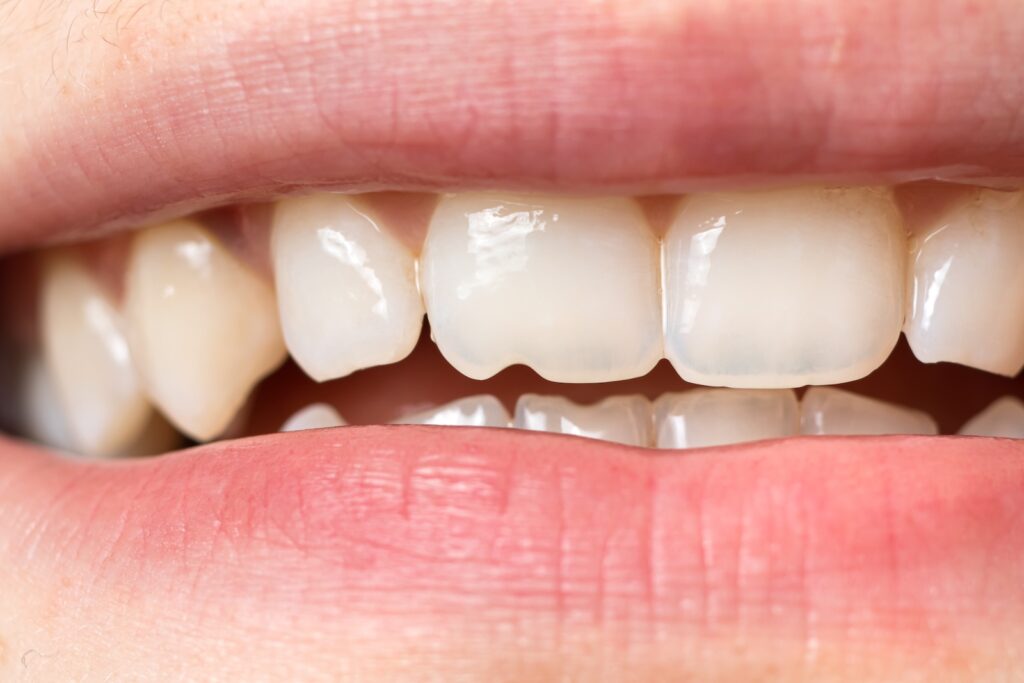Chipping a tooth can be alarming. This is more than a short-term inconvenience—a chipped tooth can have long-term effects on oral health. The foods you eat, your unique habits, your dental hygiene, and your lifestyle play a role when chipped teeth are involved.
Preventive measures are key to avoiding a chipped tooth, but sometimes, accidents happen. If you ever experience a chipped tooth, visit a dentist as soon as possible. Through treatments like fillings, tooth bonding, crowns, and more, you can effectively find relief from a chipped tooth.
What Causes Chipped Teeth?
Your teeth are protected with a strong, protective outer layer called enamel. However, different factors can weaken and damage this layer over time, like:
- Biting down on hard foods or objects
- Trauma to the face or mouth
- Cavities and tooth decay
- Grinding or clenching your teeth at night
- Erosion from acidic foods and beverages
- Malocclusion (i.e. poorly positioned teeth)
These factors can compromise the outer layer of the teeth and lead to chips.
Hard & Crunchy Foods
Biting into certain foods puts significant pressure on your teeth. If something is too hard or dense, it can strain the tooth and lead to chips. Hard candies, popcorn kernels, and nuts are all common causes of chipped teeth. Protect your teeth by being mindful of the foods you consume and how you chew them.
Poor Dental Hygiene
Proper oral care is key to protecting teeth. Neglecting your teeth can quickly lead to weakened enamel. Plaque and bacteria gradually build up without regular brushing and flossing, creating an environment where bacteria thrive. Regular visits to your dentist, combined with a strong at-home routine, go a long way in maintaining enamel strength.
Accidents & Physical Injuries
Physical trauma is another leading cause of chipped teeth. Sports-related injuries, slips and falls, and car accidents can all lead to sudden tooth damage. Wearing a mouthguard during contact sports or other high-impact activities can significantly decrease risk.
Habits & Lifestyle
Grinding your teeth, also known as bruxism, can affect dental health. This habit often stems from stress, anxiety, or sleep disorders and exerts excessive pressure on the teeth. Over time, the grinding motion creates severe wear, chipping, and even fractures.
Meanwhile, everyday habits matter as well. Using your teeth as tools—like opening a package or prying something—significantly weakens the enamel. Avoid using them as tools at all costs.
Erosion
Acidic foods and drinks—like citrus fruits, soda, and vinegar-based products—can wear away the protective enamel layer over time. Once the enamel is compromised, teeth become more vulnerable to chipping, even from everyday chewing.
Malocclusion
Malocclusion, or misaligned teeth, can also result in a chipped tooth. When your bite is uneven or crooked, certain teeth may absorb more pressure than others, increasing the risk of chips and cracks.
Orthodontic treatment can help correct alignment, balance your bite, and reduce the stress placed on individual teeth.
How to Recognize a Chipped Tooth
The first step to finding relief from a chipped tooth is to know how to recognize the problem. You can identify a chipped tooth by:
- Visible cracks or irregularities on the tooth’s surface
- Pain that worsens while chewing or biting
- Sensitivity to hot, cold, or sweet foods and beverages
- Rough edges that can irritate your tongue or cheek
If you recognize any of these, visit your dentist immediately.

Treatments for Chipped Teeth
Treatment for a chipped tooth depends on the severity of the damage. It all starts with a visit to your dentist, who can examine the area and then recommend one of the following treatments.
Tooth Bonding
Tooth bonding is an excellent solution for small chips. During this procedure, a tooth-coloured resin is applied to the affected area. It mimics the natural look and feel of your teeth to blend seamlessly into your smile.
This quick and noninvasive option is popular for minor chips. It requires no significant preparation and almost instant results.
Dental Crowns
When a significant portion of a tooth is missing or weakened, a dental crown may be required. Crowns are custom-made caps designed to cover and protect the damaged tooth.
The process involves removing damaged enamel, shaping the tooth, and creating a crown that fits over it. The crown adds strength and restores function to the tooth while providing a natural appearance.
Root Canal
A root canal may be necessary if the chip exposes the pulp at the tooth’s centre. The procedure removes the damaged pulp, disinfects the canal, and seals it to prevent infection.
Afterward, the tooth is typically topped with a crown for further reinforcement. This approach preserves the natural tooth while resolving pain and sensitivity caused by internal damage.
Tooth Extraction
Sometimes, a chip is more than a minor problem. If the damaged tooth has fractured to the base of the root , your dentist will recommend tooth extraction. This involves carefully removing the damaged tooth, which may be replaced with a dental implant, a bridge, or other restorative solutions.
Moving Teeth: Orthodontics
In some cases, chipped teeth may be the result of bite issues or misalignment. When teeth don’t meet correctly, excess pressure can cause them to chip or wear down over time. Orthodontic treatment—like braces or clear aligners—can help correct these issues.
By gradually shifting teeth into better positions, orthodontics can reduce uneven forces and protect teeth from future damage. It also enhances the overall balance of your bite, supporting long-term oral health and a more confident smile.
When to Visit a Dental Professional
Chipped teeth should never be ignored. Without quick intervention, a chipped tooth could quickly lead to worse problems. So, if you are dealing with a damaged tooth, take action.
Our team at Cooper Dental is ready to step in and help. We can determine the right approach to treating dental problems and help you find the relief you deserve. Contact our team to book your appointment today, and we can work together to keep your smile strong.




